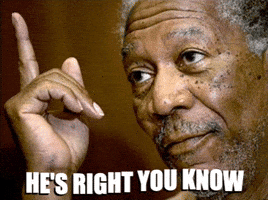- Messages
- 961
Navigation
Install the app
How to install the app on iOS
Follow along with the video below to see how to install our site as a web app on your home screen.
Note: This feature may not be available in some browsers.
More options
You are using an out of date browser. It may not display this or other websites correctly.
You should upgrade or use an alternative browser.
You should upgrade or use an alternative browser.
SCOTUS Catch-all | 2024-25 Term Ends
- Thread starter nycfan
- Start date
- Replies: 486
- Views: 17K
- Politics
lawtig02
Inconceivable Member
- Messages
- 3,986
Is it possible no other president has done so many different illegal acts in the first 130 days of his presidency?…even the two other liberal Justices were too embarrassed to join her dissent.
i’m a bit uncomfortable. As I said, I can see the benefit of a universal injunction to check the power of an executive exercising obviously unconstitutional authority like Biden’s student debt forgiveness. But the few activist district court judges grossly overplayed their hands, issuing 40 in approximately 130 days in largely 5 districts. The Supremes felt they had to put a check on them.
- Messages
- 1,328
NoIs it possible no other president has done so many different illegal acts in the first 130 days of his presidency?
lawtig02
Inconceivable Member
- Messages
- 3,986
Well, the good thing for your guy is we’ll never know.
superrific
Legend of ZZL
- Messages
- 8,907
I hope this is just trolling. You're never going to be respected -- not here, not anywhere in life -- if you can't stop yourself from putting your ignorance on display as a routine matter.…even the two other liberal Justices were too embarrassed to join her dissent.
i’m a bit uncomfortable. As I said, I can see the benefit of a universal injunction to check the power of an executive exercising obviously unconstitutional authority like Biden’s student debt forgiveness. But the few activist district court judges grossly overplayed their hands, issuing 40 in approximately 130 days in largely 5 districts. The Supremes felt they had to put a check on them.
Biden's student debt forgiveness plan was not struck down on constitutional grounds. In fact, nobody at all thought there was a constitutional infirmity. The Supreme Court held that it exceeded statutory authority (because the so-called textualists invented a loophole based on nothing), which isn't remotely the same.
As for the injunctions, many of them are duplicative because Trump kept doing the same illegal actions. Harvard got an injunction against the first set of sanctions. Then they had to get another one when they targeted international students. And another one for a different targeting. And another one for cancelling student visas. These were all the same violation -- clear infringement on speech rights. The difference between Trump and other presidents is that Trump refused to obey the law.
There were several injunctions related to the Garcia case and the flight to El Salvador. Multiple injunctions were needed because the government pretended not to understand, then tried to do the same thing but just with another agency, etc.
The problem is the lawlessness, not "activist" judges. You might note that many of the judges most critical of the administration are long-standing conservatives. Wilkinson on the 4th is about as conservative as they come, and he's been a judge for 30 years. He is not an activist. He merely cares about the rule of law. Another district court judge -- conservative appointed by Reagan!! -- referred to Trump's policies as more racially discriminatory than any he had ever seen.
Do you really believe the shit you write, or is it that you just can't deal with being wrong?
BubbaOtis
Exceptional Member
- Messages
- 206
I can't pretend to be knowledgeable on law but a Harvard law grad buddy saidJackson's dissent reads like it was haphazardly thrown together at the last minute. It's still excellently written and argued, but its structure is not as organized as I would otherwise expect and it isn't tight. The fact that she felt the need to write separately and didn't get the other liberals to join her further suggests that it was a last minute thing.
And the reason for it was the Supreme Court staying all the district court judgments against the Trump administration. This dissent isn't really about the birthright case. It's about the five stays the Supreme Court entered over the last month. In the last two cases, the executive didn't even point to Congressional authorization; it argued that it was acting according to its inherent executive authority to deport as it sees fit. Thus did the Trump administration argue that Congress could not limit its power, and the Supreme Court accepted that claim -- which is bullshit -- at least provisionally.
Well, in a world where Congress can not constrain the executive, that job falls to the Court. Otherwise, there are no checks on the executive. Someone has to restrain the president. If the Court will accept the president's contention that he has inherent executive authority to disregard the law, then it also has a concomitant obligation to ensure that the president at least obeys the constitution. Otherwise, we have no rule of law.
There are a couple of side notes here as well.
1. People who judge Justice Jackson on the color of her skin -- like our resident conservatives -- probably don't realize that she sees herself as an originalist. But she's not the Good German type of originalist as the majority. Consider that these "originalists" have now given the President monarchical powers. How is that originalism? Of all the things that we know the Founding Fathers DID NOT WANT, it was a monarch. So how is it possible for the originalist court to have arrived at the one place that everyone can agree the Founders did not want?
One answer is originalism is stupid and was never anything but a justification for abortion restrictions that metastasized into an uncontrolled monster. Another is that the unitary executive theory in particular is and always has been a load of horseshit.
Jackson offers a different diagnosis: the Court falls into line by understanding its role as deciding cases tiny issue by tiny issue without pausing to think about the larger consequences. So the majority says, "our role here is only to decide whether the universal injunction had an analogue in the practice of the English Chancery courts or the early Republic," it has already forfeited the game. In essence, the Court has reasoned itself piecemeal into upholding tyranny, and is thus helpless against the modern assertion of power. Of course the practice of the English Chancery Court did not protect itself against modern fascism. In 1690 it was impossible for the government to drive up in a van, throw people inside in silence or darkness, and then transport them hundreds of miles away to secret facilities. Absent reliable small arms fire, such a small crew could never assert control over a scene; it was an age, after all, of large slow armies that killed with thousands of inaccurate bullets, not precision semi-automatic fire.
Barrett has no response to this, which is why she chooses the longstanding approach of bullies everywhere: laughing at the speaker and hiding behind numerosity.
2. Barrett wrote something ridiculous, as she is wont to do, and was being called on it. Let's contemplate her assertion that
"JUSTICE JACKSON decries an imperial Executive while embracing an imperial Judiciary . . . In other words, [she finds it] unnecessary to consider whether Congress has constrained the Judiciary; what matters is how the Judiciary may constrain the Executive.
This is one of the most illogical and dangerous assertions in the history of the Supreme Court. It's the product of a mind trained to dwell on niggling provisions while ignoring the big concepts that apparently elude ACB and the majority. And it is THIS statement, not anything Justice Jackson wrote, that is lawless beyond comprehension.
A. First, at the outset: if the executive is ignoring Congress' limits on its power, why the hell should the Court feel itself bound by jurisdictional requirements set forth hundreds of years ago in a very different context? Basically, this is an Enabling Act: the Court isn't actually endorsing the fascism, but it's letting the fascism happen. The Executive has the military. Congress does not. Literally the only thing stopping the Executive is the rule of law. And if the rule of law disappears, then the court has no power to do anything. ACB has given away all of the Court's power to a tyrannical regime, which undermines her claim to be respecting the Court's proper jurisdiction. It would be the equivalent of arguing morality as the gravedigger is burying you alive.
B. Moreover, the total amount of power is fixed as between the branches of government. The question being presented in this case is how to divide up that power. The Framers saw it as a 33/33/33 type of distribution -- checks and balances for everyone. But that's not the way things have unfolded, and now we are looking at something more like 5/(95-X)/X where X is the power the judiciary claims. Maybe Congress' power is a 10 not a 5, or maybe it's almost zero as some commentators are saying. Doesn't matter to the point.
Anyone who thinks even slightly about this question will soon realize that an "imperial judiciary" is merely cutting into the executive's power. If the court asserts X = 20, then the Executive is still too strong but its power is still containable. But if the court asserts X = 2, because Congress long ago determined jurisdictional limits that are meaningless if the Executive can ignore the constitution, all that it has done is allow the executive to have 93%.
That is to say, ONLY an "imperial judiciary" can check an "imperial executive." ACB gets it completely and utterly wrong. The court asserting Article III authority to check Article II authority is not an increase in tyranny, as ACB implies. It's a bulwark against it.
3. The consistent theme across years now of SCOTUS bullshitting has been the fetishization of "separation of powers" to the exclusion of checks and balances. They seem not to grasp that separation of powers was never an end in itself; it was a means to the ultimate end of constraining the county's leader to lawfulness and not individual whims and discretion. The Framers divided the world into a) people who make the law; b) people who enforce the law; and c) people who declare the law. Note, in a cruel irony, ACB actually cites Marbury v Madison as a case about deference to the judiciary, which tells you all you need to know about her abilities as a con law professor (it's no wonder she couldn't name all the protections of the 1A).
And the pattern gets repeated now at great stakes. The Framers wanted the Judiciary to exceed its jurisdiction if necessary to fight the overreach of the executive. We know this because the overriding, overarching goal was to prevent tyranny.
It is nonsensical to think that the Framers would have thought that they could anticipate all forms of tyranny and properly analyze it. The Framers did not future courts to be asking, "do these remedies (or laws) closely match with the remedies that existed in 1789." After all, "it is a constitution we are expounding." The Framers wanted the co-ordinate branches to keep asserting themselves against overreaches of authority. Should it be necessary for the judiciary to fashion a new remedy for new assaults on freedoms, the Framers unambiguously wanted the court to do that.
This bolded paragraph is really what Jackson's dispute is about.
"When the other side uses Marbury v. Madison to oppose your position, you might want to take a moment and reconsider."
superrific
Legend of ZZL
- Messages
- 8,907
Marbury v Madison cuts the wrong way for ACB. Your buddy's comment only makes sense if Marbury is properly invoked.I can't pretend to be knowledgeable on law but a Harvard law grad buddy said
"When the other side uses Marbury v. Madison to oppose your position, you might want to take a moment and reconsider."
BubbaOtis
Exceptional Member
- Messages
- 206
One again, I'm out of my area of expertise but the x tweet with the screenshot of the ruling included a reference to the particular portion of Marbury v Madison that supports the majority position.Marbury v Madison cuts the wrong way for ACB. Your buddy's comment only makes sense if Marbury is properly invoked.
superrific
Legend of ZZL
- Messages
- 8,907
Right, but it was a mis-cite. Or a very weak one. The overriding lesson of Marbury, of course, is that the judiciary has the responsibility to state the law, not simply to decide cases (as the majority claims here). The specific outcome of the case was dictated by politics: Marshall thought his assertion of judicial authority would be better received if it was paired with a gesture of humility -- i.e. declining jurisdiction in a specific case of no import.One again, I'm out of my area of expertise but the x tweet with the screenshot of the ruling included a reference to the particular portion of Marbury v Madison that supports the majority position.
In any event, if the point was that there is **some** limit on judicial power, duh. The judiciary can't order the military into action either. That's what I mean by it being wrong or incredibly weak. Marshall didn't have to address the usurpation of authority by the executive, so the question of Article III power to check the executive never arose. That's the issue here.
1moretimeagain
Iconic Member
- Messages
- 1,813
Mulberry Heel
Iconic Member
- Messages
- 2,485
McConnell and Trump's packing of the court is really paying off for Republicans and right-wingers. It's destroying the Court's credibility, but they don't care as long as Republicans get what they want, and they'll gladly dare Democrats to disobey their rulings, and it's very unlikely that the Democratic Establishment will, even as those rulings leave them at a greater and greater disadvantage in future elections.
superrific
Legend of ZZL
- Messages
- 8,907
Ugh. This campaign finance case is going to be a fucking disaster.
THOUGH: a ruling invalidating restrictions on what party committees can do would weaken the dark money money groups who control tons of $$ specifically because they are the workaround to donating to parties. To whom are Gorsuch, Kav and ACB more indebted? Trump and the GOP? Or Leonard Leo? And what outcome would Leo want? Arguably the one that preserves his power.
The same would be true for Paul Singer and Harlan Crow. They bought Supreme Court justices. Those are valuable assets, and they wouldn't want competition from national political parties.
THOUGH: a ruling invalidating restrictions on what party committees can do would weaken the dark money money groups who control tons of $$ specifically because they are the workaround to donating to parties. To whom are Gorsuch, Kav and ACB more indebted? Trump and the GOP? Or Leonard Leo? And what outcome would Leo want? Arguably the one that preserves his power.
The same would be true for Paul Singer and Harlan Crow. They bought Supreme Court justices. Those are valuable assets, and they wouldn't want competition from national political parties.
dukeman92
Iconic Member
- Messages
- 1,593
- Messages
- 22,568
“… The order allows the government to immediately send the men, who hail from countries around the world, to war-torn South Sudan. Neither the United States nor South Sudan has said what will happen to the men on their arrival.
Justices Sonia Sotomayor and Ketanji Brown Jackson dissented.
The court last month paused a trial judge’s rulingthat all migrants whom the government seeks to deport to countries other than their own must first be given a chance to show that they would face risk of torture. That order was brief and gave no reasons, which is typical when the justices act on emergency applications.
…
Judge Murphy, who was appointed by President Joseph R. Biden Jr., denied the motion as unnecessary. He said he had issued a separate ruling last month, different from the one the Supreme Court had paused, protecting the men in Djibouti from immediate removal.
He added that Justice Sonia Sotomayor had made the same point in her dissent from the ruling, which Justices Elena Kagan and Ketanji Brown Jackson joined. “The district court’s remedial orders are not properly before this court because the government has not appealed them,” she wrote.
In Thursday’s ruling, the majority rejected that distinction, paused both sets of rulings and allowed the deportations to South Sudan.“
- Messages
- 22,568
“… The order allows the government to immediately send the men, who hail from countries around the world, to war-torn South Sudan. Neither the United States nor South Sudan has said what will happen to the men on their arrival.
Justices Sonia Sotomayor and Ketanji Brown Jackson dissented.
The court last month paused a trial judge’s rulingthat all migrants whom the government seeks to deport to countries other than their own must first be given a chance to show that they would face risk of torture. That order was brief and gave no reasons, which is typical when the justices act on emergency applications.
…
Judge Murphy, who was appointed by President Joseph R. Biden Jr., denied the motion as unnecessary. He said he had issued a separate ruling last month, different from the one the Supreme Court had paused, protecting the men in Djibouti from immediate removal.
He added that Justice Sonia Sotomayor had made the same point in her dissent from the ruling, which Justices Elena Kagan and Ketanji Brown Jackson joined. “The district court’s remedial orders are not properly before this court because the government has not appealed them,” she wrote.
In Thursday’s ruling, the majority rejected that distinction, paused both sets of rulings and allowed the deportations to South Sudan.“
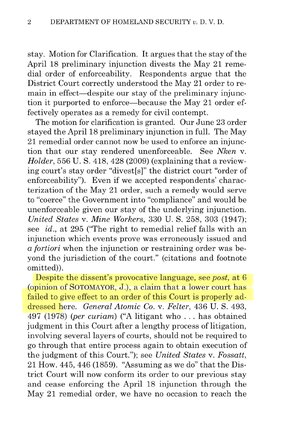
——
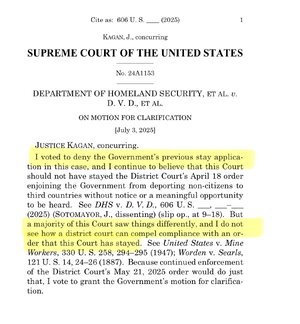
——
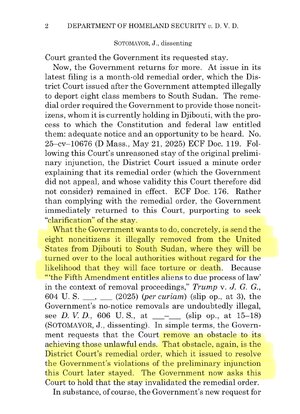
…
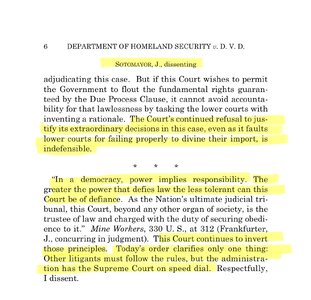
BillOfRights
Honored Member
- Messages
- 879
Can we put scotus in a shipping container for 6 weeks and then deport them?
- Messages
- 3,012
We can't, but Trump could if he wanted to I think.Can we put scotus in a shipping container for 6 weeks and then deport them?
Callatoroy
Iconic Member
- Messages
- 2,022
Or maybe she shouldn’t be teaching kids at all. Some kind of standards rather than putting warm bodies in classrooms. In no world should she be teaching.Well, if pubs would start putting money into public education, instead of taking from it, perhaps that teacher could've received the support she needed to improve as an educator.
stankeylegjones
Iconic Member
- Messages
- 1,109
You're right. Heaven forbid we give support to those in one of the most important occupations. That would be foolish.Or maybe she shouldn’t be teaching kids at all. Some kind of standards rather than putting warm bodies in classrooms. In no world should she be teaching.
Share:

